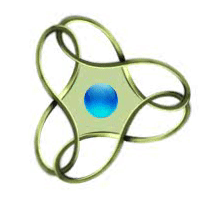|
|
Nurture Learners Today and Leaders Tomorrow:
|

Background
In 2003, a generic Teacher Competencies Framework (TCF) was introduced by the then Advisory Committee on Teacher Education and Qualifications (ACTEQ) to lay out the landscape of professional growth for teachers. The TCF has since been widely accepted in the school sector as a planning tool for continuing professional development (CPD).
Furthermore, the Government prescribed in 2002 six core areas of leadership for the professional development of principals, namely (1) strategic direction and policy environment; (2) learning, teaching and curriculum; (3) teacher professional growth and development; (4) staff and resources management, (5) quality assurance and accountability; and (6) external communication and connection to the outside world. These six core areas have since guided the overarching professional development and leadership programmes for aspiring, newly appointed and serving principals.
In June 2013, the then ACTEQ was reconstituted as the Committee on Professional Development of Teachers and Principals (COTAP). With the series of reforms and changes in the education landscape in the past decade, COTAP considers it timely that the TCF and the six core areas of leadership should be reviewed, updated and enhanced.
In-depth discussions with various stakeholder groups have revealed that there is a need for a coherent set of standards for the teaching profession, including both teachers and school leaders at different stages of maturity along the continuum of professional growth. This should take the form of a set of professional standards, namely the T-standard+, which aims to provide a clear reference and anchor for teacher preparation, CPD and school leadership development, targeting a positive impact on student learning and growth.
There are three phases in the development of the T-standard+:
|
Phase |
From |
Foci of work |
|
1 |
August 2014 |
Deliberating and formulating an updated set of professional standards for teachers |
|
2 |
February 2016 |
Deliberating and formulating an updated set of professional standards for principals |
|
3 |
December 2016 |
Piloting and refining the draft T-standard+ |
A Special Meeting on Review of TCF, with Prof HAU Kit-tai as the Convenor, was set up under COTAP in August 2014 to start the work of Phase 1 to formulate an updated set of professional standards for teachers. Other members of the Special Meeting include teachers and school leaders, parents, and representatives from school sponsoring bodies (SSBs) and teacher education universities (TEUs) etc.
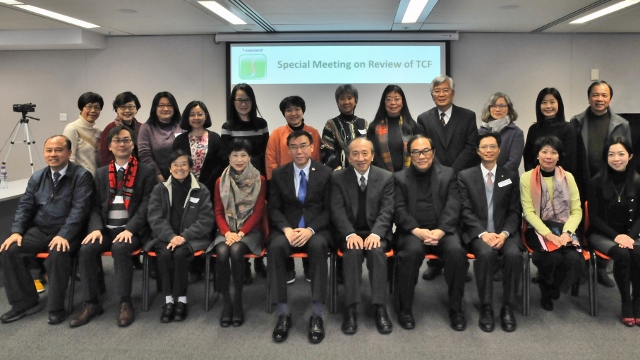 |
|
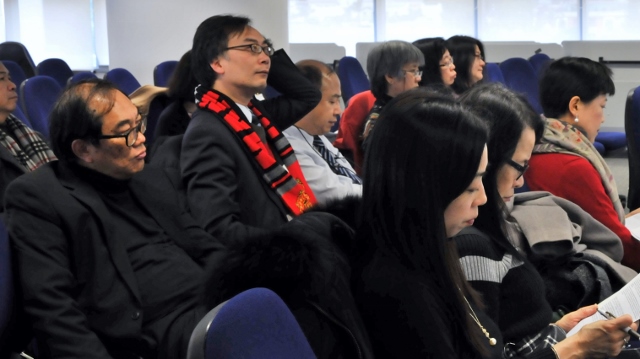 |
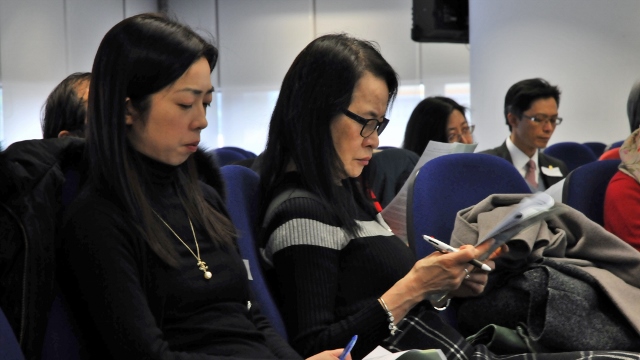 |
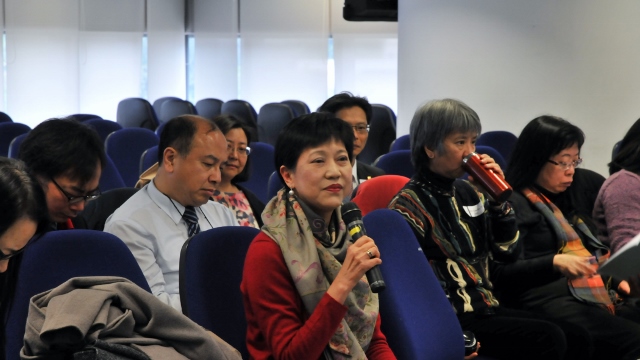 |
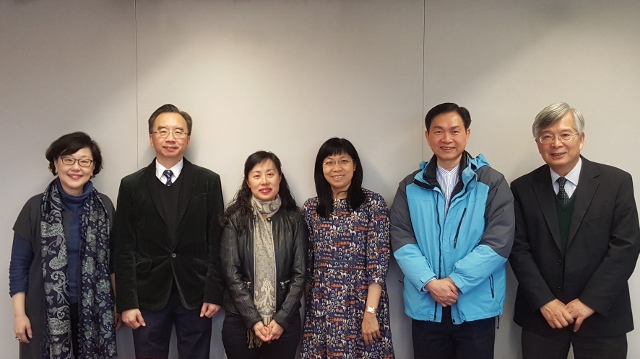 |
|
The 6th Special Meeting on Review of TCF (24 February 2016)
|
|
On completion of Phase 1 in February 2016, the Special Meeting was reconstituted into the T-standard+ Consortium), with an expanded membership, and Prof HAU Kit-tai as Convenor and Sr Cecilia WONG Yeuk-han as Chief Advisor. The T-standard+ Consortium steered the work in Phase 2 and continued extensive discussions on the development of an updated set of professional standards for principals.

T-standard+ Consortium in a gist
Set out below are the composition of the T-standard+ Consortium and its foci of work:
|
Composition |
Foci of work |
|
|
Professional Learning Community (PLC) |
About 55 members |
Focusing on practices and experience from the frontline perspective |
|
Co-opted System Partners |
About 10 representatives |
Focusing on expectations and requirements from the system perspective |
|
Expert Group |
About 15 representatives from both the PLC and Co-opted System Partners |
Focusing on fundamental beliefs, theoretical underpinnings and underlying principles from the research perspective |
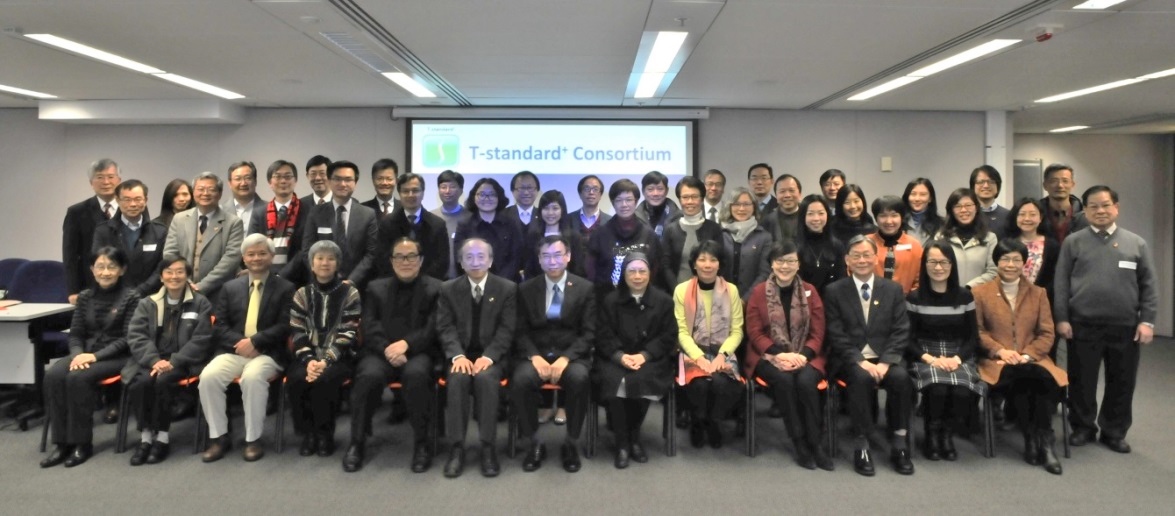
The 1st Meeting of the T-standard+ Consortium (24 February 2016)
|
|
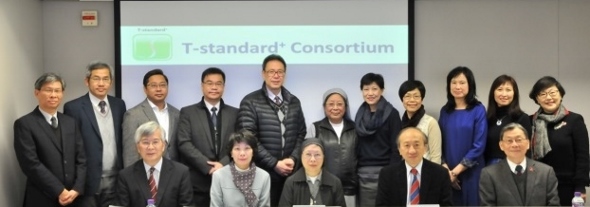
The 1st Meeting of the Co-opted System Partners of
the T-standard+ Consortium (25 February 2016) |
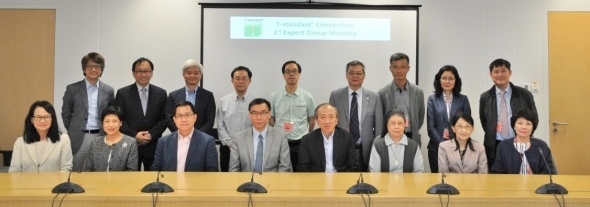
The 1st Meeting of the Expert Group of
the T-standard+ Consortium (19 May 2016) |
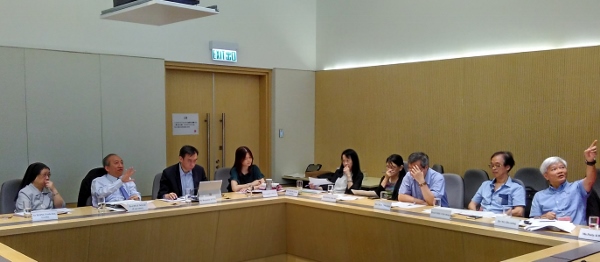
The 2nd Meeting of the Expert Group of
the T-standard+ Consortium (7 July 2016) |
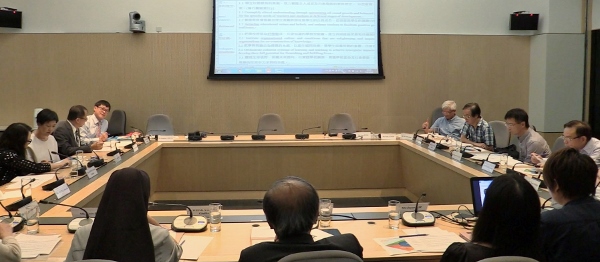
The 3rd Meeting of the Expert Group of
the T-standard+ Consortium (7 September 2016) |
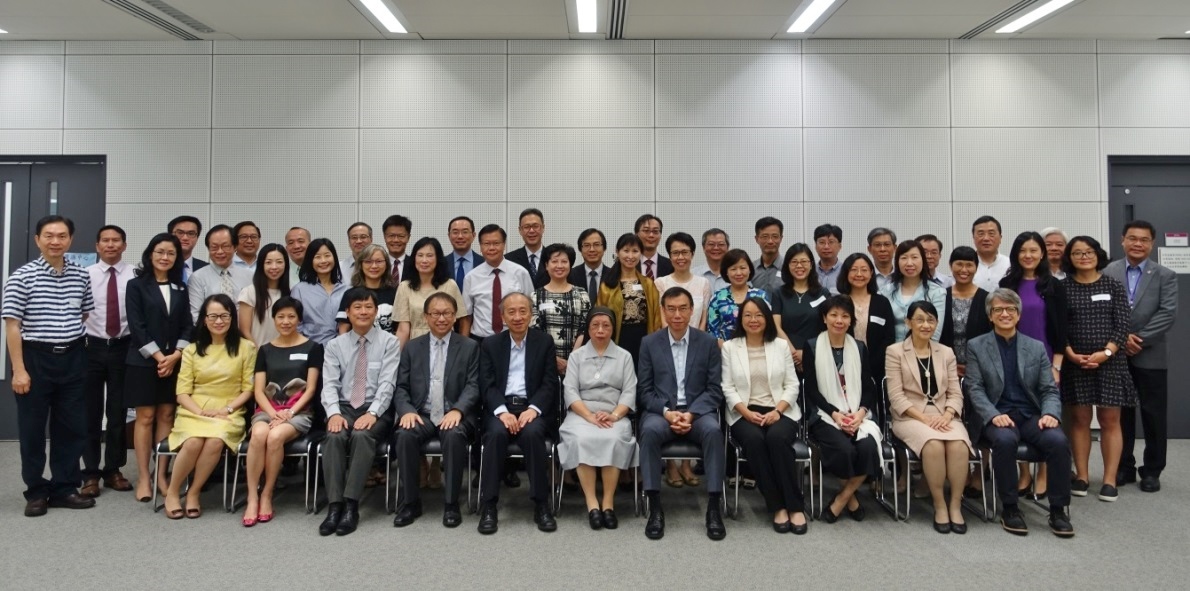 |
|
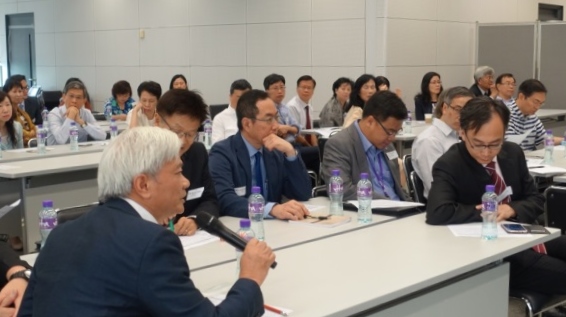 |
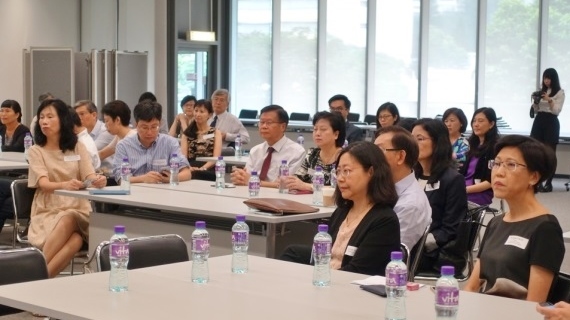 |
The 2nd Meeting of T-standard+ Consortium (28 September 2016)
|
|
Through the T-standard+ Consortium, COTAP further engages stakeholders and gauges views from diverse perspectives on the development and implementation of the T-standard+.
Review of policies and practices from global and local perspectives
In Phases 1 and 2, extensive literature reviews of education policies and good practices of high-performing education systems were undertaken so that members of the Special Meeting and subsequently the T-standard+ Consortium are acquainted with the global trends of education in the 21st century. Competency standards and frameworks, as well as programmes for initial teacher education (ITE) and for principals, from around 20 high-performing regions, including Shanghai, Australia, California, Finland, Ontario, Singapore and the United Kingdom, were studied to identify key features and strengths. The findings of the literature reviews were shared and deliberated amongst members to evaluate their relevance and applicability in the context of Hong Kong.
A student-centred approach to developing the T-standard+
While adopting a global perspective, members of the Special Meeting and the T-standard+ Consortium also revisited the aims of education for the 21st century as laid down by the Education Commission (EC) in its published policy documents issued since 1999. These documents, as well as the more recent curriculum documents published by the Curriculum Development Council present a consistent direction of the education reform in Hong Kong – promoting all-round development and lifelong learning through a student-focused curriculum.
The fundamental questions were discussed as to how the aims of the education reform can be achieved in an era of unprecedented technological advances, fast changes and keen international competition under the intensified impact of globalisation, and how we could better prepare our students for these challenges through education. Members of the Special Meeting and the T-standard+ Consortium are generally of the view that the following essential attributes –Whole-person Wellness, Key Competences for Adulthood, and Change Agility for Tomorrow, will well-equip students to pursue self-management, self-regulation and lifelong learning, for the increasingly complex challenges of the 21st century.
A student-centred approach has thus been adopted in the development of the T-standard+, which encompasses the essential knowledge, skills and attitudes required of teachers and school leaders in the coming decades. It follows that the T-standard+ has to align with the three essential student attributes of “Whole-person Wellness, Key Competences for Adulthood, and Change Agility for Tomorrow”, which will help our learners today become leaders of tomorrow.
Good progress has been made in the development of T-standard+. After in-depth discussions and methodical review of international policies and good practices as relevant to the Hong Kong context, it is considered that the interlocking roles of teachers and principals underpinning the draft T-standard+ could be as follows:
|
Professional roles of teachers |
Professional roles of principals |
|
Caring Cultivators
Inspirational Co-constructors
Committed Role Models
|
Ethical Enablers
Versatile Architects
|
Sharing on the professional roles of teachers and principals in relation to student learning and growth can be viewed in the following video clips:
|
Video Clip (Chinese version only) |
Speaker |
|
Professional Roles of Teachers (PowerPoint Download) |
Mr Benjamin YUNG Secretary of COTAP |
| Professional Roles of Principals |
Sr Cecilia WONG Yeuk-han Chief Advisor of the T-standard+ Consortium |
|
Dr TSANG Wing-hong (Principal of Chiu Chow Association Secondary School) Expert Group Member of the T-standard+ Consortium |
|
|
Mr LO Wai-shing (Principal of Evangel College) Expert Group Member of the T-standard+ Consortium |
|
|
Mr YEUNG Veng-meng, Derek (Principal of Po Leung Kuk Camões Tan Siu Lin Primary School) Expert Group Member of the T-standard+ Consortium |
The proposed T-standard+ aims at inspiring teachers and school leaders to reflect on their professional roles in supporting student learning and growth.
The T-standard+ logo
The T-standard+ logo comprises three interlocking infinity symbols which signify the interlocking nature of the three professional roles of teachers and school leaders in preparing students to meet future challenges. The interplay of these professional roles of teachers, i.e. Caring Cultivators, Inspirational Co-constructors and Committed Role Models, and those of principals, i.e. Ethical Enablers, Versatile Architects and Visionary Edupreneurs, would enhance students’ whole-person wellness, key competences for adulthood, and change agility for tomorrow, which are necessary for their all-round development and lifelong learning. The infinity shapes (∞) featured in the logo symbolise the countless threats and opportunities that students may face. They also resemble the Chinese embroidered knots which highlight Hong Kong’s unique East-meets-West advantage.
The T-standard+ logo illustrates the interplay of
the professional roles of teachers and principals to enable
learners today to become leaders of tomorrow
Application
The T-standard+ will be a coherent set of standards for the teaching profession including both teachers and school leaders at different stages of maturity along the continuum of professional growth. It aims to provide a clear reference for teacher preparation, CPD and school leadership development, targeting a positive impact on student learning and growth.
Since the implementation of school-based management (SBM) in 1999, schools have become the loci of change and many good practices have flourished in the school sector, leading to diversity, innovation and better quality of education. Against this favourable backdrop, most schools have made modifications to the generic TCF (2003) and developed their own sets of TCF specific to their contexts and needs. Members of the Special Meeting are of the view that the positive impact brought by the TCF (2003) should be sustained. The proposed T-standard+ will thus continue to be generic, and open to adaptation by schools and SSBs.
Similar to the TCF (2003), the proposed T-standard+ would serve as a developmental tool, revealing areas in which individual teachers and school leaders might specialise or excel at different stages of professional maturity. The T-standard+ aims at helping individual members of the teaching profession locate their current stage of growth and draw up their personalised CPD plan to meet both immediate and long-term professional development needs. On the other hand, for the wider benefits of students’ growth and achievement, schools and SSBs will need a pool of expertise with diverse and complementary talents and strengths. The T-standard+ could provide them with useful reference for charting collectively the competency profile of teachers and/or school leaders, planning CPD at organisational level and for continuous improvement and sustainable development. The T-standard+ would be able to support and facilitate CPD planning, implementation and evaluation at both individual and organisational levels.
As a set of professional standards jointly developed with extensive involvement of, and input from stakeholders, the T-standard+ will facilitate positive alignment at system level and a coherent direction for the planning, design, delivery and review of ITE for student teachers and for CPD of serving teachers and school leaders.
Way forward
In Phase 3 which starts end of 2016, the professional standards will be further elaborated into Stage Descriptors. The Stage Descriptors for teachers will outline the professional maturity expected of them at threshold, competent and accomplished stages, and those for principals will depict the leadership skills expected of them at newly appointed, competent and accomplished stages. Upon the drafting of the Stage Descriptors, pilot studies will be conducted with support from schools and TEUs to further refine the draft T-standard+ based on feedback and evidence collected in the local context.


